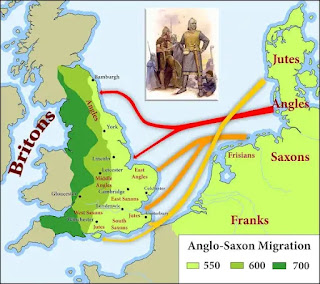Elegiac elements in the Anglo-Saxon Lyrics
A Sombre mood of melancholy reflection predominates in a group of Anglo- Saxon poems; and by virtue of their lyrical quality, these poems seem to stand apart from the heroic and the religious. These poems strike the true elegiac mood and have nothing to do either with the Germanic world or paganism. Nor are they Christian save and except in some of their details and conclusions. They are lyrical in that they express the personal feelings and emotions of the poets themselves. These Anglo-Saxon verses strike, as Emile Legouis and Louis Cazamian point out, ‘perhaps more truly than the authentic fragments of Celtic poetry, that note of lamentation, at once personal and human, to which the name of Ossianic has been given.’ Let us have a look into the important lyrics of this period:
1) The Wanderer: Consisting of 115 lines, “The Wanderer” is a song of friendship. The subject matter of this elegy is the lamentation of a young man for his dead master. The wanderer travels in a ship alone and friendless, seeking a home for peace and protection. His fervent love for his dead lord leads him to dream in his sleep of his union with him. But, with his utter astonishment and despair, the wanderer wakes up on a cold and lovely sea and finds himself still haunted with the pang of separation from his kind lord.
2) The Seafarer: “The Seafarer” in 141 lines in the most original and beautiful Anglo-Saxon lyrical elegy. It is, as David Daiches puts it, the monologue of an old sailor who recalls the loneliness and hardships of a life at sea while at the same time aware of its fascination’:
How I carked with care, in the ice-cold seaOverwent the winter on my Wander ways,All forlon of happiness, all bereft of loving kinsmen,Hung about with icicles; flew the hail in showers
(Translation: Stopford A. Brooke)
This poem seems to be in two distinct parts- the first part shows the hardships of ocean life. While the second part is an allegory, in which the troubles of the seaman are symbols of his troubles of this life, and the call of the ocean is the call of the soul to be up and away to its true home with god. “The Seafarer” opens the floodgate of lyrical poetry rich equally in impulsiveness and imagination- the two basic elements in English lyrics.
3) Deor’s Lament: “Deor’s Lament”, a 42 line poem is the lyrical outburst of a poet in trouble, who has been ousted by a rival poet, Heorrenta from his rights and lands. He hopes to overcome but that does not brighten the poem itself much.
4) The Ruin:- “The Ruin” of which only 41 lines of legible matter have been discovered, is a melancholy reflection upon the ruins of a great city. With the same nostalgic melancholy that we find in 19″ century Romantic poetry, the poet thinks of the mighty builders who are now under the earth. From the description of the city, the scholars have identified it with the city of Bath, destroyed by the Saxons in 573, on the ruins of which later a monastery was built.
5) The Wife’s Complaint: This poem, so full of rich poignant feelings has been regarded as a wife’s lament for her exiled lord, but it may also be the effusion of the grief of a young theign unable to leave the country and join his lord. The singer remembers that she and her lord often pledged to one another that not but death would separate them. But now the husband is away and she is Suffering for his faithfulness. She is being persecuted by the kinsmen of her husband and is forced to dwell in the forest grove surrounded by the high hills. She can imagine her husband’s mental suffering in exile where he remembers his happy home. She puts the whole blame on their enemies and curses them with all the bitterness she is feeling.
6) The Husbands Message:- Making use of the device in the ‘Riddle’, in “The Husband’s Message” which consists of two parts, the lover in exile explains his present position to his anxious wife at home. The first part only touches on the lineage of the tree on which the message is carved in runes. The second part informs her how the husband is being driven away by his enemies.
7) The Wulf and Edwacer:- Once considered to be a Riddle by Cynewulf, “The Wulf and Edwacer” is an enigmatic poem. In this dramatic monologue, a woman laments her separation from her lover Wulf. With a lovelorn heart, she complained of the unbearable suffering. It is difficult to ascertain if Edwacer is her husband.
In fine, these lyrics grew out of and in connections with great epic cycles. Some of these elegies are true reflections like modern elegies. What is particularly remarkable in them is their intensely personal note. In their themes -love banishment, passion for the sea and nature they may, therefore be called the precursors of a good deal of the lyrical poetry of coming ages.
#Elegiac_elements_in_the_Anglo_Saxon_Lyrics
